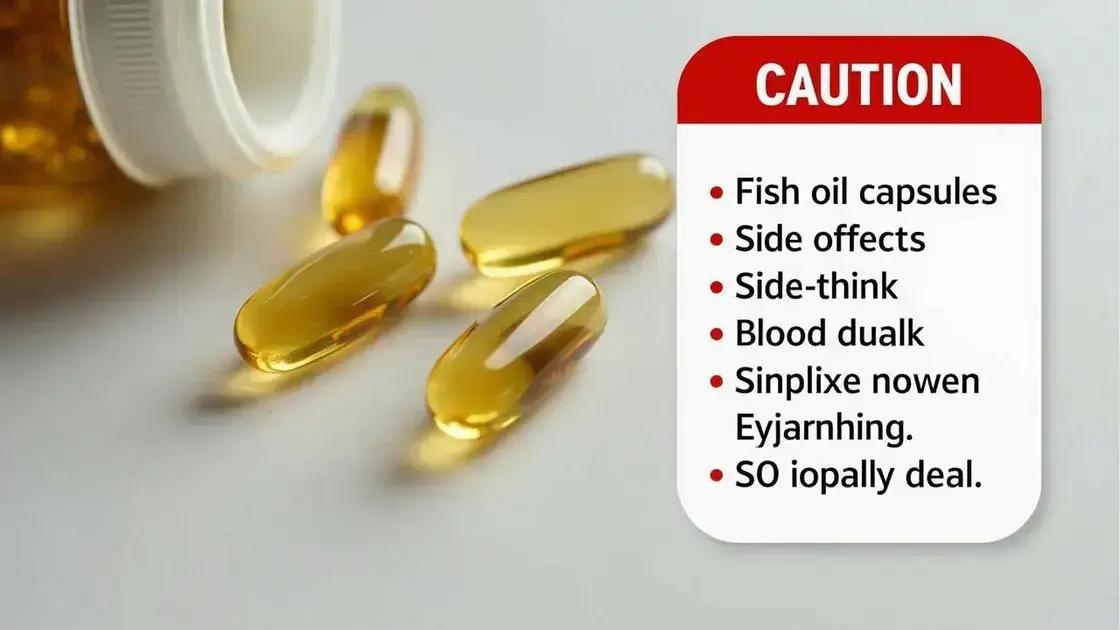Fish oil plays a key role in supporting cardiovascular health by providing omega-3 fatty acids that lower triglycerides, reduce inflammation, and promote overall heart wellness. Recommended dosages typically range from 500 to 1000 mg per day, and natural sources include fatty fish like salmon and sardines. However, potential risks such as blood thinning and side effects may occur, so consulting a healthcare provider is advisable before starting any supplements.
Fish oil has gained significant attention for its potential in supporting cardiovascular health. Rich in omega-3 fatty acids, fish oil has been linked to numerous heart benefits, including reducing inflammation and lowering cholesterol. In this article, we will dive into the role of fish oil in supporting cardiovascular health, explore its benefits, suggest recommended sources, and discuss possible risks associated with its consumption.
Understanding Fish Oil and Its Benefits

Fish oil comes from the tissues of oily fish. It is a rich source of omega-3 fatty acids, which are essential for good health. Unlike saturated fats, omega-3s are known to support heart health by lowering bad cholesterol levels and reducing blood pressure.
Major Benefits of Fish Oil
Research shows that fish oil can reduce the risk of heart diseases. By taking fish oil supplements or consuming fatty fish like salmon, mackerel, and sardines, one can achieve a better balance of omega-3 to omega-6 fatty acids in the body. This balance is crucial for reducing inflammation and preventing chronic diseases.
Cardiovascular Health
The omega-3 fatty acids in fish oil help prevent blood clots and decrease triglycerides, a type of fat found in the blood. Studies indicate that regular intake can lead to lower rates of heart attack and stroke.
Additional Health Perks
Apart from heart benefits, fish oil contributes to brain health and supports mental function. It can also enhance joint health and relieve arthritis symptoms. Thus, including fish oil in your diet can provide numerous health benefits.
Getting Enough Fish Oil
To reap the benefits, aim for two servings of fatty fish each week. If you don’t consume fish regularly, consider discussing fish oil supplements with your healthcare provider. It’s important to choose a high-quality product to maximize benefits.
How Fish Oil Impacts Heart Health

The link between fish oil and heart health is well established. The primary ingredients in fish oil are omega-3 fatty acids, which play a key role in promoting cardiovascular wellness. These healthy fats are known to reduce inflammation, a significant contributor to heart disease.
How Omega-3 Fatty Acids Work
Omega-3 fatty acids in fish oil can help lower levels of triglycerides in the blood. High triglyceride levels are a risk factor for heart disease. Regular consumption of omega-3s can also help maintain blood pressure at healthier levels, which is crucial for heart health.
Reducing Inflammation
Chronic inflammation can harm blood vessels and lead to heart-related issues. Fish oil works to decrease inflammatory markers in the body, thus supporting heart health directly. This reduction in inflammation can also lead to improved overall body health.
Effects on Blood Clots
Research indicates that omega-3 fatty acids can make blood less likely to clot. By improving the flexibility of blood cells, fish oil helps to maintain clear blood flow, which is vital for preventing heart attacks and strokes.
Preventive Benefits
Regularly consuming fish oil may lower risk factors associated with heart disease. Studies show individuals who take fish oil supplements or eat fatty fish have lower chances of developing heart problems. This makes fish oil an important part of a heart-healthy diet.
Recommended Dosage and Sources of Fish Oil

To get the best benefits from fish oil, it is crucial to know the right dosage and sources. The American Heart Association recommends at least two servings of fatty fish each week, which is roughly 500-1000 milligrams of omega-3 fatty acids daily.
Recommended Dosage
If you choose to take fish oil supplements, follow the instructions on the label or consult your healthcare provider for personalized advice. A common dosage is about 1000-2000 mg of combined EPA and DHA (the main omega-3 fatty acids).
Natural Food Sources
Excellent sources of fish oil include fatty fish like salmon, sardines, mackerel, and herring. These fish are not only tasty but also loaded with nutrients that support heart health.
Fish Oil Supplements
If you don’t eat fish often, consider fish oil supplements. These come in liquid or capsule form. Look for high-quality products that are purified to remove harmful contaminants like mercury. Always choose brands that provide the amount of EPA and DHA.
Consulting Your Doctor
Before starting any supplement regimen, it’s smart to talk to your doctor, especially if you have existing health issues or are taking other medications. They can help you find the right dosage for your needs.
Potential Risks and Considerations of Fish Oil

While fish oil offers many health benefits, it is important to be aware of potential risks and considerations. Not everyone should take fish oil supplements, and some individuals may experience side effects.
Possible Side Effects
Common side effects of fish oil supplements include stomach upset, nausea, and a fishy aftertaste. Some people may also experience diarrhea or bloating. If these symptoms occur, adjusting the dosage or taking the supplements with meals can help.
Blood Thinning Effects
Fish oil can have a blood-thinning effect. This might be beneficial for some people but poses a risk for others, especially those taking blood thinners like warfarin. It is vital to consult with a healthcare provider before starting fish oil if you are on medication that affects blood clotting.
Dietary Restrictions
People with allergies to fish should avoid fish oil supplements. Additionally, those with certain conditions, such as hypothyroidism or autoimmune diseases, should also seek medical advice before adding fish oil to their diets.
Quality of Supplements
Not all fish oil supplements are created equal. It is essential to choose high-quality products that are tested for purity and free from contaminants like heavy metals. Always read labels carefully and opt for brands with a good reputation.
In Conclusion, Embracing Fish Oil for Heart Health
Fish oil is an essential component in supporting cardiovascular health. Its rich omega-3 fatty acids offer numerous benefits, from lowering triglycerides to reducing inflammation.
Incorporating fish oil into your diet can lead to improved heart health, especially when taken in recommended dosages. However, it is crucial to be aware of potential risks and considerations, including possible side effects and interactions with medications.
By choosing high-quality fish oil supplements and consulting with a healthcare professional, you can safely enjoy the benefits of fish oil while maintaining a healthy heart.
Regular consumption of fatty fish and fish oil can significantly contribute to a heart-healthy lifestyle, making it a valuable addition to your diet.
FAQ – Frequently Asked Questions about Fish Oil and Cardiovascular Health
What are the main benefits of fish oil for heart health?
Fish oil is rich in omega-3 fatty acids, which help lower triglycerides, reduce inflammation, and prevent blood clots, supporting overall cardiovascular wellness.
How much fish oil should I take daily?
The American Heart Association recommends at least 500-1000 milligrams of combined EPA and DHA from fatty fish or fish oil supplements per day.
Can fish oil supplements cause side effects?
Yes, some may experience side effects like stomach upset, nausea, or a fishy aftertaste. Consulting a healthcare provider can help mitigate these effects.
Are there any risks associated with fish oil?
Fish oil can thin your blood, which may be risky for those taking blood-thinning medications. Always consult with a healthcare provider before starting supplements.
What are good sources of fish oil?
Great sources of fish oil include fatty fish like salmon, sardines, mackerel, and herring. High-quality fish oil supplements are also available if you don’t consume enough fish.
How can I ensure the quality of fish oil supplements?
Choose fish oil supplements that are purified to remove contaminants and look for brands that provide third-party testing to ensure quality.













